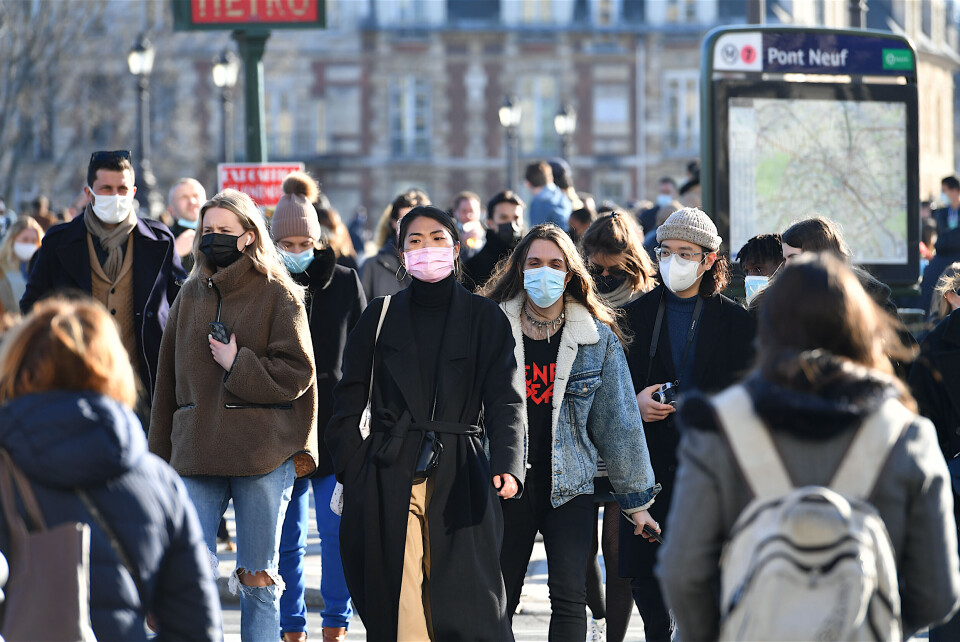-
Why your car insurance in France is expected to increase this year
Premiums are forecast to rise by four to six percent in 2026
-
Two Britons killed in avalanche in French Alps were with an instructor
French skier also died in the disaster at Val d’Isère on Friday February 13
-
British Airways launches bargain £2 flights to France (but there’s a catch)
The flights are only available to members of the airline’s Avios scheme who are redeeming loyalty points
Covid: Face masks obligatory in streets of Paris from December 31
Specialist says spread of virus is less outside but is not zero - and that masks are essential in crowded areas

Face masks will once again become obligatory outdoors across Paris and surrounding departments from Friday, December 31, police have confirmed, as Covid-19 continues to spread.
Masks will be required outdoors in central Paris, as well as the departments of Hauts-de-Seine, Yvelines, Essonne, Val d’Oise and Val-de-Marne.
They will also be required in the surrounding areas of the Paris airports Paris-Charles de Gaulle, Paris-Orly and le Bourget.
The rule will not apply to people inside vehicles, to motorbike users, to cyclists or to people practising sport, such as jogging.
It also does not apply to the Bois du Boulogne and the Bois de Vincennes.
Is wearing a mask outdoors worth it?
Professor Yves Buisson, epidemiologist and president of the Covid department at the Académie nationale de médecine, has said that wearing a mask is essential, especially in crowded areas.
He told FranceInfo: "Everyone in France must realise that we are entering a critical phase in which all precautionary gestures are essential. The spread is less outside than inside, but it is not zero, especially in crowded areas.
“Everyone must realise that this virus is very contagious, and that we must strengthen precaution measures, the wearing of a mask being an essential measure.”
He said that a “surgical mask works very well for short journeys” but that for longer journeys, such as on a plane or train, an FFP2 mask is recommended.
New Year’s Eve rules
The police prefecture in the capital has also brought in new rules for New Year’s Eve in Paris and surrounding areas.
- All bars and restaurants will be required to close at 02:00 on January 1 and 2
- All dancing events in public establishments are banned
- Ban on “gatherings of people involving the consumption of alcoholic beverages in public”, and ban on drinking in public (such as on the street outside a bar)
- Consumption of alcohol and takeaway sales of alcohol prohibited from 18:00 on Friday, December 31; to 06:00 on Saturday, January 1.
Two people per second test positive in France
It comes as Tedros Adhanom Ghebreyesus, head of the World Health Organisation, warned that the two Covid variants of Omicron and Delta are set to cause “a tsunami of cases” around the world.
In France, the virus is still spreading rapidly.
Health Minister Olivier Véran said: “The [current] figures are worrying. Every second, two people in France test positive for Covid.”
The latest figures from health body Santé publique France show that in the past 24 hours (to December 29), there were 208,099 new confirmed cases, and the R number (over 1 means the virus is spreading) has risen from 1.1 to 1.2.
Read more:Covid France: over 208,000 new cases recorded in last 24 hours
In Paris, the level of incidence (the number of cases per 100,000 people) has reached more than 2,000. The previous alert levels were 50-200.
In practice, the number means that more than 2,000 out of every 100,000 inhabitants has tested positive for Covid this week, making Paris the most-affected area in mainland France.
Yet, all departments have an incidence rate far higher than the alert threshold of 50, with the national average now at 760.
In Paris, 797 people are in hospital with Covid-19, of which 188 are in intensive care units.
Related articles
France announces new monthly €100 bonus for intensive care nurses
10% of people in France are Covid contact cases, says health minister
























